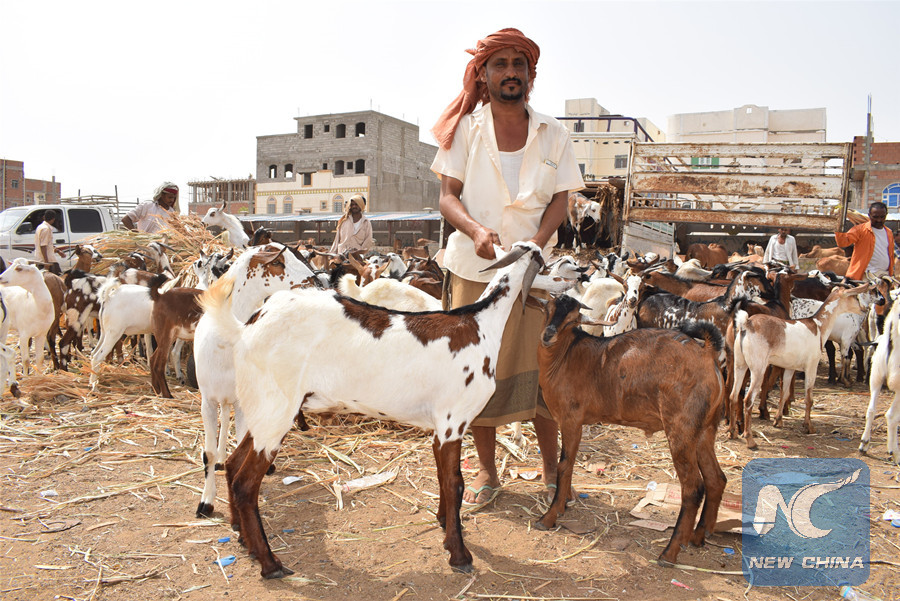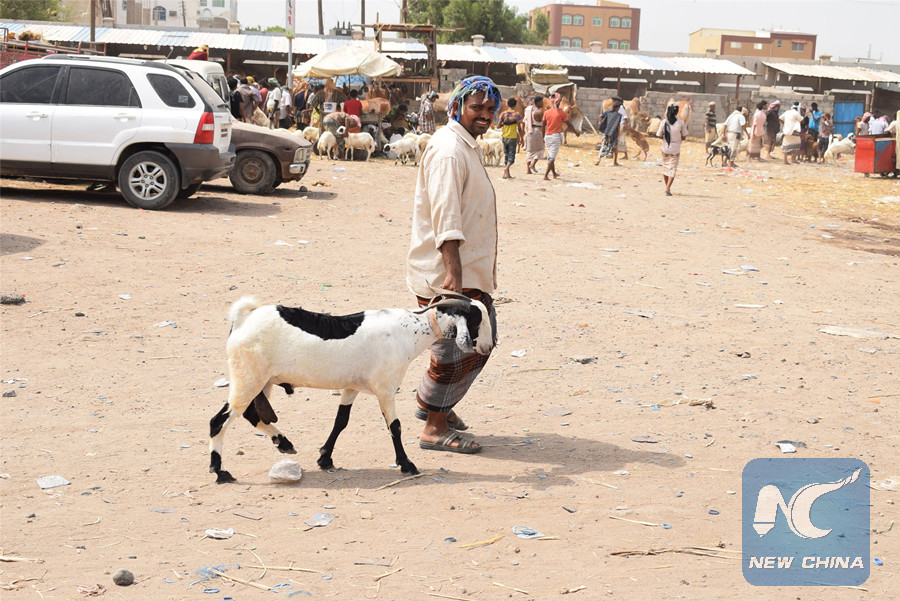
A vender waits with his goats at a livestock market in Aden city, Yemen, on Aug. 16, 2018. (Xinhua/Murad Abdu)
ADEN, Yemen, Aug. 17 (Xinhua) -- Cattle markets in the main cities of war-torn Yemen are recently thronged with customers eager to buy sacrificial animals for Eid al-Adha, the second of the two Islamic holidays celebrated worldwide.
During the annual festival of Eid al-Adha starting from Aug. 21, Muslims across the world would celebrate by sacrificing a goat or sheep, and then eating it together with families and friends.
However, the market prices for some livestock in Yemen this year have increased sharply ahead of the four-day Eid al-Adha, or the "Festival of Sacrifice," making it difficult for most people to afford animals for this holy festival.
Many citizens in the southern port city of Aden lost their hope, saying they could not endure the soaring prices and this Eid al-Adha will be celebrated without sacrificial animals.
A local billy goat, which was priced at 40,000 Yemeni rials (159.8 U.S. dollars) during last year's Eid al-Adha, is now fetching more than 90,000 rials in a livestock market in Aden.
Bashir Jamal, a citizen living in Aden, said Eid al-Adha is the only annual occasion that brings his family and relatives together to taste different types of dishes amid joy and happiness.
"Despite the rising prices, I will continue to look for my suitable goat because Eid al-Adha won't be good without it," Bashir said.
"It looks that I will travel to other neighboring provinces like Abyan or rural areas where livestock prices are a bit low. Here in Aden everything is high," he said.

A man smiles after buying a goat at a livestock market in Aden city, Yemen, on Aug. 16, 2018. (Xinhua/Murad Abdu)
Despite the rising prices, all markets in Aden and neighboring areas were crowded with customers before Eid al-Adha, said Majed Salim, another buyer at the market.
"The rising prices will not deprive citizens from buying their sacrificial animals because they will sell anything just to find a solution for this obstacle," Salim said.
"To overcome the unreasonable prices, I'm planning to sell my wife's jewelry to get money and then buy a good sheep," he said.
"Some of the Yemeni citizens will be helpless and won't find a solution like mine particularly during these difficult days," the man lamented.
Meanwhile, livestock traders complained about high transport costs and the continuing depreciation of Yemen's rial against foreign currencies.
"During this annual occasion we always increase our business and get some good money and this year everything was doubled priced, not only livestock," said Ahmed Bam Ali, a livestock trader.
The impoverished Arab country has been locked into a civil war since 2014, when the Iran-backed Shiite Houthi rebels overran much of the country militarily and seized all northern provinces, including the capital Sanaa.
The Saudi-led Arab coalition intervened militarily against Houthis in March 2015 in response to an official request from Yemeni President Abd-Rabbu Mansour Hadi to protect Yemen.
Three quarters of the entire population, or more than 22 million Yemenis, urgently require humanitarian help, including 8.4 million who struggle to find their next meal.

